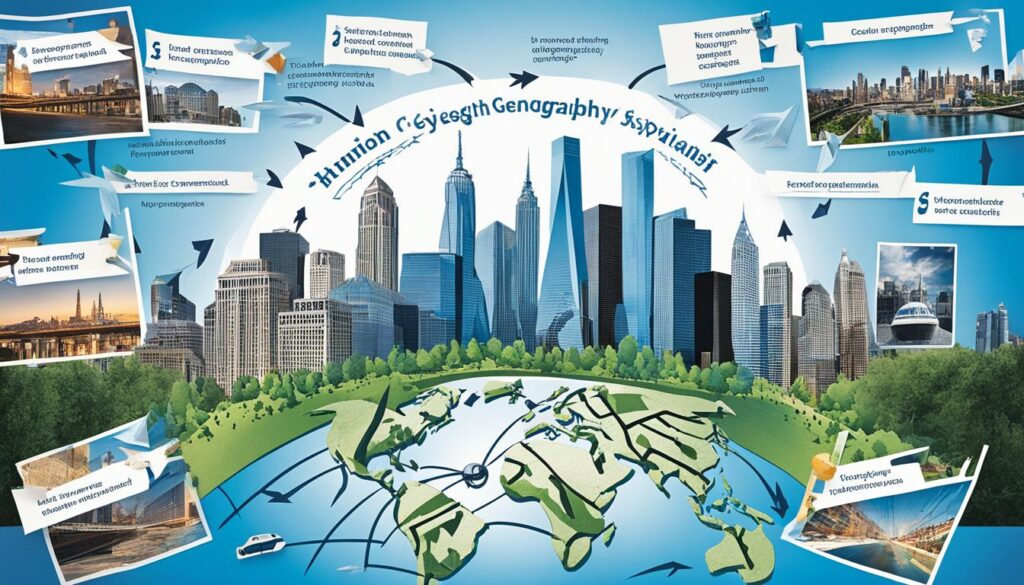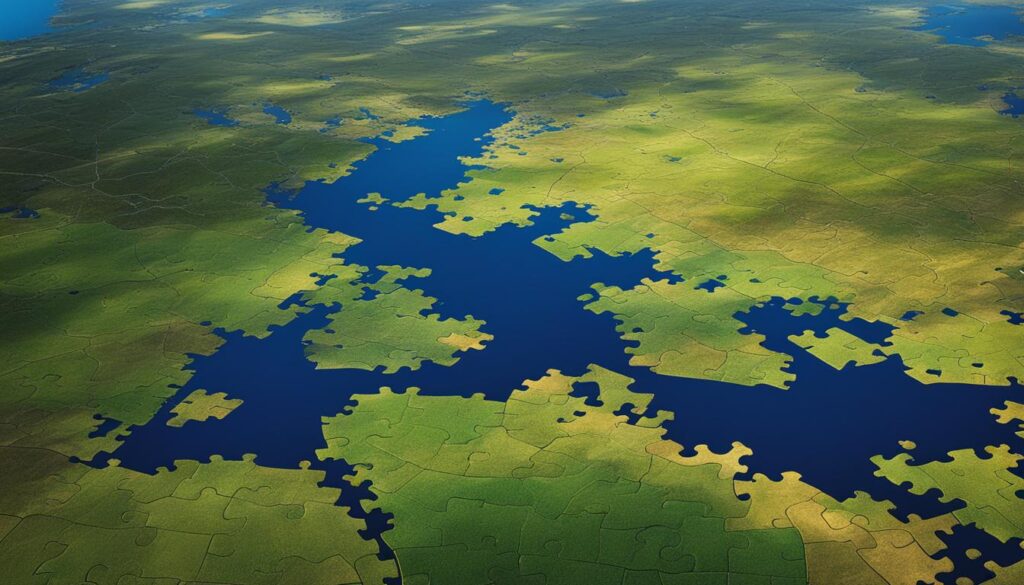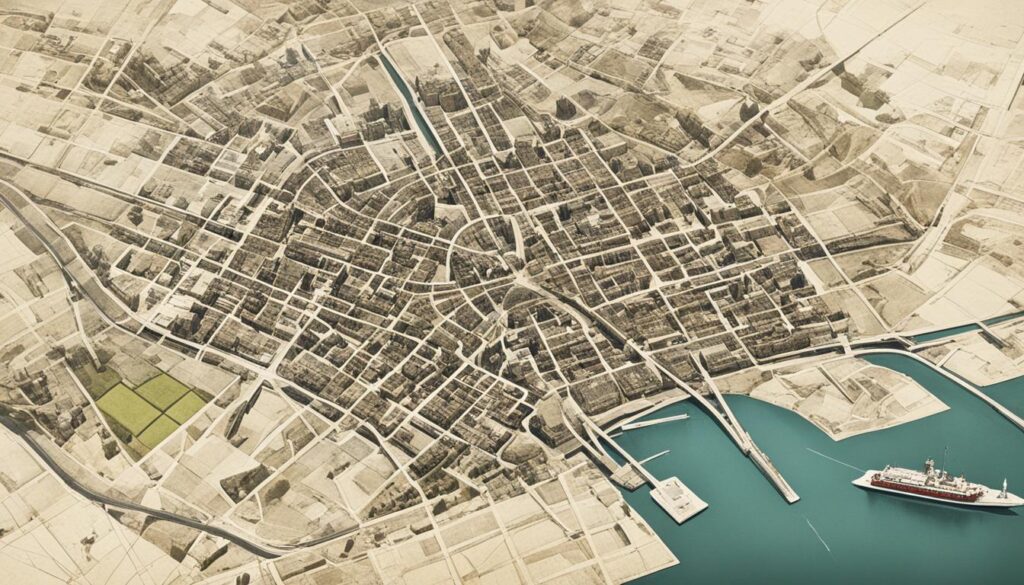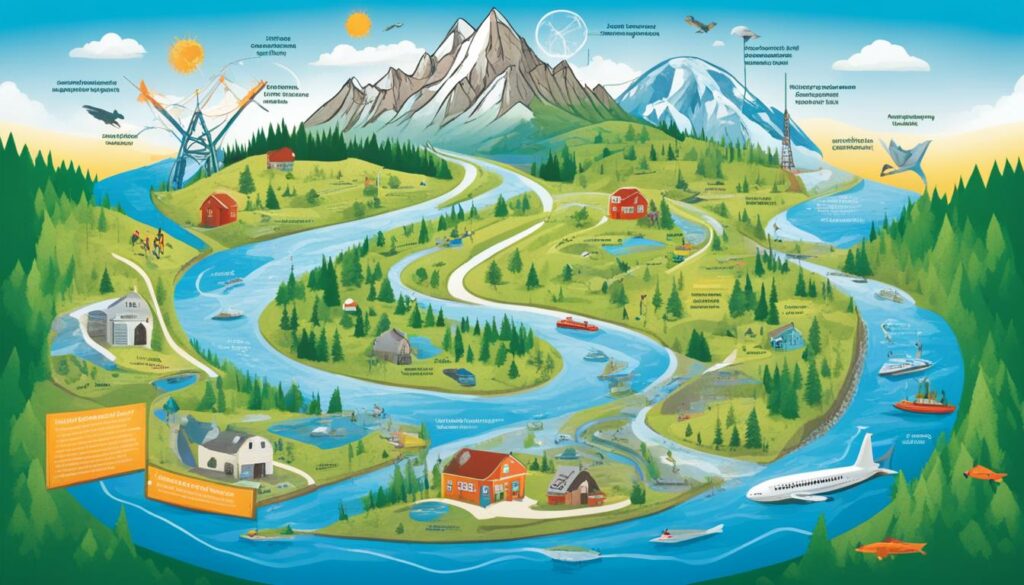Every year, millions of students study geography without realizing its huge impact on their futures. It’s more than high school quizzes and atlases. Geography is the key to career and personal success. Many think geography is just about maps. But it’s actually about knowing how our world is linked. Wondering how geography will help you later? It connects environmental issues and cultural diversity. This mix is crucial for doing well in today’s global job scene.
Knowing geography is a must for future success. As the world changes, geographical knowledge helps us understand space, cultures, and the planet. Geography’s role is clear. It gives us skills that are in demand in a fast-paced world. This subject helps in personal growth, too. By learning about the relationship between people and the environment, geography makes us smarter and ready for tomorrow’s chances.
Key Takeaways
- Geography extends well beyond map reading, influencing personal and professional development.
- Spatial awareness and environmental understanding are key skills for thriving in the global workforce.
- Cultural fluency, an outcome of studying geography, is crucial for successful interactions within diverse teams and markets.
- Understanding the importance of geography can lead to informed decisions impacting local and global communities.
- Geographical knowledge is a springboard for future success, offering a competitive edge in various career paths.
Exploring the Discipline of Geography
Geography goes beyond maps and the basic memorizing of capitals and countries. National Geographic shows us that it’s about studying places, communities, and their interactions with their environment. Each part connects to others, creating our world’s amazing complexity.
Defining Geography Beyond Maps
Geography skills are crucial in school and the real world. Knowing about land and human patterns brings useful insights. It helps us understand and navigate our surroundings. It teaches us how nature affects culture and economies.
Understanding Spatial Relationships and Environmental Dynamics
Geography studies change and our planet’s health. It lets us address big issues like climate change and fair resource use. I see how people’s actions affect our planet’s well-being.
Learning geography means I care about our planet’s future. It gives us deep world knowledge and ways to improve things. Geography helps us create a sustainable tomorrow.
The Integration of Physical and Human Geography
I’ve discovered that Earth’s beauty lies in physical and human geography. One must see how landscapes have shaped civilizations and how our cultures reflect on these terrains. It’s not just about nature’s creations like mountains and rivers. It’s also about how people live, their cultures, and what they practice in these settings.
Physical Landscapes and Their Influence on Civilization
Physical landscapes have always shaped our stories. As a passionate geography student, I’ve seen how climate, resources, and landforms shape societies. Learning geography shows us the big impact of nature on our lives. Throughout history, civilizations thrived by understanding their natural surroundings. They built cities near rivers for trading and farmed on rich soils.
The Study of Cultural and Societal Developments Globally
Looking at human geography, I’ve found our cultures and legacies mirrored. It shows how societies, languages, and beliefs spread across the world. Physical settings set the stage, but human geography fills it with stories. This study helps us see how connected we are. It shows how trade and ideas have linked the world together.
This fascinating connection between the geographical realms keeps inspiring me. Everything is connected from the Himalayas influencing South Asia’s climate to cities visible from space. It reminds us that knowing about geography helps us understand our global place.

Exploring geography has shown me the strong influence of both nature and humans. It’s more than just looking at a map. It’s about seeing how geography shapes our world and appreciating its power.
How Will Geography Help Me In the Future
Studying geography opens up more than just knowing new places. It helps us understand our world better, which leads to success in various careers. By learning about different cultures and ecosystems, my thinking has grown. I’ve learned to make strategic decisions using geography.
Geography is directly related to our daily lives and shows how important geographic information is for jobs. Whether it’s making marketing plans or handling natural resources correctly, geography is key. This has made me excited about the many job opportunities in geography.
- Urban and Regional Planning: Focused on making community spaces good for the environment.
- Environmental Management: I can help with efforts to keep our planet safe and adapt to climate change.
- Geographic Information Systems (GIS): This is about using the latest tech to map and study places.
Geography teaches us things that can help us do good in the world. I want to use what I’ve learned to help communities, maybe by making policies, boosting geotourism, or raising awareness about our planet.
In the end, studying geography prepares us for the job world today. The advantages of learning geography go beyond school. They open doors to many career paths we might choose to follow.
Geographical Skills as a Foundation for Lifelong Learning
In my journey, I’ve learned that knowing about geography isn’t just good for work. It helps keep learning and adapting. With new technology in geography, these skills help us keep up with workplace and world changes.
Developing Spatial Awareness and Navigation Abilities
My time in the field has taught me how crucial geography is for making smart choices. Geography’s future uses are limitless, with understanding space at its heart. Knowing how to use maps and geographic information helps us solve real-life problems, which is essential in today’s complex world.
Enhancing Multicultural Understanding and Global Perspectives
Geography connects cultures. It has helped me learn more about the world’s diverse societies. It’s key to building cross-cultural bonds and seeing the world from new viewpoints, which is vital for personal insight and career progress.

| Geographical Skill | Application in the Workplace | Future Relevance |
|---|---|---|
| Map Reading & Interpretation | Route Planning and Logistics | Enhanced with Increasing Geospatial Data |
| Cultural Fluency | International Relations and Trade | Imperative for Global Market Integration |
| Environmental Analysis | Sustainability Initiatives | Crucial for Climate Change Responses |
| Data Visualization | Urban Planning and Development | Augmented by GIS and VR Technologies |
Geography and Its Role in Global Interdependence
Exploring global interdependence shows us how the impact of geography on job prospects is key. It has become crucial for those aiming to excel in their careers. A deep understanding of geography helps us see how connected our world is. It also points out how geography matters in future industries.
It’s important to think about where our resources come from. And how different areas depend on each other for these resources. This makes us see how geography affects sustainability and supply chains. Resource decisions impact job opportunities in logistics, environmental science, and international relations.
Technology also shapes where jobs are located. Industries like renewable energy, digital communications, and biotechnology depend on global resources, talents, and markets. These sectors show how geography affects them:
| Industry | Geographic Relevance | Impact on Job Prospects |
|---|---|---|
| Renewable Energy | Site-specific resource availability, environmental policies by region | Increase in specialized roles in sustainable development and energy management |
| Digital Communications | Data protection laws vary globally. Emerging markets have different digital infrastructure needs | Growth in cybersecurity jobs, infrastructure development roles across regions |
| Biotechnology | Patent laws and regulations regarding global health concerns require diverse applications | Expansion of research and development opportunities, global health initiatives |
My reflections have taught me something important. Knowing about geographic relevance in future industries is more than just knowing the land. It’s about understanding the world’s political, social, and economic patterns. With geographic insight, we can navigate our planet’s terrains and complex market landscapes.
The Adaptable and Versatile Nature of Geographic Skills
Exploring geographic skills reveals their deep value beyond just map reading. In our fast-moving world, these skills open many doors in different fields. They’re like a key to unlocking chances in various careers.
Employability and the Versatility of Geographic Proficiency
Geographic knowledge is incredibly versatile. It lets people understand space, see population patterns, and read landscapes. This makes for a skilled and flexible workforce. People with these skills find work in urban planning, saving the environment, and keeping countries safe. It shows how geography can fuel your career.
Geographic Information Systems (GIS) and Future Technologies
Now, being good at geospatial technology like GIS is essential. GIS lets us gather, keep, study, and show geographic data. This tool is key for solving today’s tough problems and planning cities. People skilled in GIS lead the way in making new technologies.
Geographic skills grow with tech advances. They help people stay important and shape a smart future. These skills mix accuracy, deep understanding, and vision.
Linking Geography with Global Citizenship
Studying geography offers many benefits, far beyond just classrooms and books. It helps us understand the world’s cultures, environments, and economies. This knowledge is key for career development and for making an impact in the global market. It’s also crucial for embracing our role as global citizens.
Learning geography helps us see how connected our world is. This understanding drives us to take responsible actions locally and globally. It makes us want to protect the environment and promote sustainability. These are important parts of being a global citizen.

Below is a table showing how geography helps in careers and global citizenship.
| Aspect of Geography | Contributions to Career Development | Global Citizenship Enhancement |
|---|---|---|
| Cultural Proficiency | Ability to work in diverse teams and markets | Enhanced empathy and cross-cultural communication |
| Environmental Literacy | Opportunities in sustainable development and conservation | Active participation in ecological preservation |
| Geopolitical Awareness | Strategic decision-making in international relations | Informed engagement with global affairs |
| Spatial Analysis | Skills in urban planning and GIS technology | Appreciation of how spatial design affects community living |
Exploring geography has given me valuable insights. These insights help in my career and as a global citizen. I’ve learned lessons that help me join global discussions and positively impact society.
Understanding the Past to Navigate the Future
When we explore human history, it’s clear that geography isn’t just a school subject. It’s a tool that helps us link our past to what we do today and our plans for tomorrow. Knowing geography helps us advance in our careers by showing us trends and links. This makes us better at making strategic choices in a tough job market.

History shows us how trade routes changed economies and how fights over land shaped countries. These facts teach us valuable lessons. They help us understand how the world works today, including the global market.
Geography’s Contribution to Historical Context
Looking at ancient empires, we can see how geography often decided their fate. Whether mountains protected them or rich land helped them thrive, geography played a big role. It helped shape cultures and economies over the ages.
Preparation for Globalized Interaction and Marketplaces
Thinking about the future, it’s clear we need to be ready for a global market. Geography gives us insights that prepare us for working together globally. It equips us to adapt to different work settings and challenges.
| Historical Insight | Career Relevance | Application |
|---|---|---|
| Trade Expansion Routes | International Business Strategies | Understanding global market trends and economic exchanges |
| Urbanization Patterns | Development Planning | Analyzing demographic shifts for urban and regional development |
| Cultural Diffusion | Marketing and Public Relations | Designing culturally sensitive and effective communication campaigns |
| Resource Distribution | Environmental Management | Planning sustainable use of resources in business operations |
Environmental Awareness Through Geographic Studies
Geographic studies are vital for promoting environmental sustainability. They highlight the significance of geography in career development and its role in sustainable practices, which are essential for our future success. Understanding geography helps us see our impact on Earth. It makes us think about our choices for the future, both for us and the planet.

Developing Sustainable Thinking with Geographic Concepts
Geographic concepts have taught me that sustainability is a practical way of life. Through geography, I’ve examined environmental issues in many ways, including everything from local plans to global climate actions. Geography guides my choices regarding environmental support, which is becoming key for careers in many fields.
Climate Change Narratives and Geographic Insight
Geography gives me insights into the stories of climate change. It’s not just science but stories that influence people and policies. With a geographic perspective, I contribute to meaningful talks on the environment. This shows how such discussions affect career development in urban planning and environmental law areas.
| Geographic Concepts | Application in Sustainability | Relevance to Career Growth |
|---|---|---|
| Spatial Analysis | Resource Management and Urban Planning | Emerging roles in Smart City development |
| Ecosystem Services | Creative conservation strategies | Growth in environmental consulting |
| Climate Patterns | Advocacy for policy change | Influence in policy-making entities |
| Cultural Geography | Community engagement in sustainable practices | Leadership positions within non-profits and NGOs |
Geographical Analysis in Everyday Life
Every day, geography shapes my decisions more than I realize. Planning my commute or choosing a vacation spot shows how geographical knowledge benefits me. It boosts my spatial reasoning, helping me navigate daily challenges. As I explore cities and online maps, I see how geography offers me global perspectives. It deepens my view of our diverse world.
Geography comes into play whether I’m checking the weather for a trip or choosing where to live. It’s not just for finding my way around. It also helps me solve problems in my personal and work life. Understanding geography lets me tackle issues like climate change, economic shifts, and local problems like an expert.
Geography means more to me than just reading maps. It helps me understand the deeper stories behind locations. This insight reveals cultural, economic, and ecological details you can’t get from just an address. By valuing geography, I can navigate to new places and grasp the history and culture that shape them.
| Aspect of Life | Geographical Influence | Outcome |
|---|---|---|
| Travel | Optimizing Routes | Time and Fuel Efficiency |
| Housing | Assessing Location | Long-term Investment Value |
| Shopping | Market Analysis | Supporting Local Businesses |
| Recreation | Recreational Area Attributes | Enhanced Leisure Experience |
| Environment | Climate Patterns | Adaptability and Preparedness |
Geography helps me make smarter choices every day. It’s like seeing the world with new eyes. This skill is key for making good decisions, understanding the world, and handling changes around me. Geography is more than a school subject. It’s a vital part of my daily life.
The Practical Utilization of Geography in the Workplace
When thinking about geographical skills for future success, it’s clear that geography gives us a deep understanding of our world. Its impact is more than just academic. It helps us see how geography affects our career paths. By knowing this, we can better adapt to changes in the job market, which is vital in today’s fast-changing work environment.
The tech sector illustrates this perfectly. GIS specialists use their knowledge to drive innovation. They analyze spatial data to help businesses decide where to set up shop. Environmental consultants, with their geographic knowledge, promote sustainable practices. This benefits both our planet and industries relying on natural resources.
Geography benefits not only high-tech jobs but even marketing. Marketers now use geographic data to target specific audiences, ensuring messages reach those most likely to respond and affecting buying habits based on region.
Geographical knowledge shines in many areas:
- Real Estate Development: Helps evaluate land use and plan cities.
- Logistics: Improves route efficiency, saving money and time.
- Economic Forecasting: Allows for better market predictions and strategies, thanks to geographic trends.
This has led me to explore roles where geography is key. See the table below for examples:
| Job Role | Geographic Skill Application | Impact on Career |
|---|---|---|
| Urban Planner | Spatial analysis for city design and sustainability | Advances careers in public sectors and consulting. |
| Environmental Risk Assessor | Evaluating potential geographical hazards | Crucial for risk management and policy making. |
| Agricultural Manager | Understanding terrain and climate for crops | Leads to better yields and sustainable farming. |
| Travel Advisor | Using geographic knowledge for unique travel plans | Boosts client satisfaction and loyalty. |
From my experience, I’ve learned how geographic skills for the future job market offer a unique way to tackle challenges. Geography can predict societal shifts and analyze physical spaces. This discipline is essential for growth and unlocking professional potential.
Academic and Research Opportunities in Geography
Geographic research opens a door for those drawn to our planet’s complexities. It shows us the dynamic relationship between people and their environments. This field is swimming in new technologies, promising a bright future for study and real-world use. As I explore this area, the future of geographic technology excites me. It shows tools and methods that could change how we see the world.
Geographical Research Shaping Our Understanding of the World
My path in geographic research goes beyond regular study. It’s a dive into what shapes societies and natural environments. The data I collect helps make models and frameworks, which are used to make big decisions about city development and nature conservation. My work in research adds to the important conversation on keeping our world resilient and sustainable.
Academic Pathways and Specializations within Geography
My geography journey is as varied as the landscapes I study. Focusing on fields like map-making or environmental geography quenches my thirst for knowledge. It also equips me with the means to understand our changing planet. There are many career paths for geography lovers, from exploring cultural geography to delving into geographic information science.
These academic pathways and new geographic tech are bringing about a fresh era of discovery. Here, my love for geography meets the practical needs of Earth. This union creates new answers to old problems. The chances to make a real difference are as vast as our planet.
My Final Thoughts
Looking ahead, I see how key geography is for my growth. It’s more than reading maps. It’s about making smart choices. Geography has been a game-changer for me. It helps me navigate the world’s complex cultures and places.
Geography helps us in real ways, not just in theory. It opens doors for future jobs, is like a compass for my career, and keeps me ready for new challenges. Geography’s insights boost my chances in many fields, like urban planning and conservation.
I’ve learned we’re all connected through geography. This knowledge is vital for my career’s future. I look forward to using what I know about geography. It’s not just for school, but a guide for life’s opportunities in our connected world.
